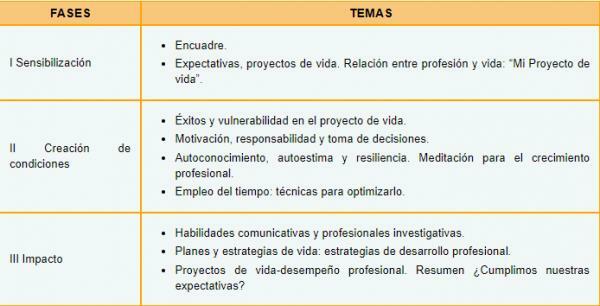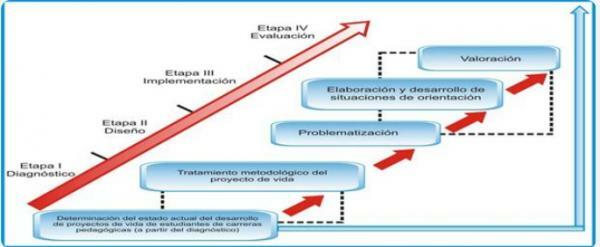
The training of the new generations generates needs that society and education must satisfy; One of the challenges faced by the professional training model for students of pedagogical careers is reflection and decision-making for the development of life projects. The research originates from the theoretical and methodological inconsistencies for the development of life projects in the pedagogical professional training process. In this sense, a personological and comprehensive orientation proposal is offered to students of pedagogical careers for the development of the project of life, as an integrating structure of professional-personal development through integration levels of orientation as procedures that identify and stimulate the essential elements of the personal, school and professional area and their insertion in the professional training process from the integrative tendency of the guidance, through a system of workshops, distinguished by content, contexts and guidance modalities, under the guidance of the tutor counselor.
In this PsychologyOnline article, we talk about a Orientation strategy for the development of life projects under the direction of the teacher - counselor.
Index
- Theoretical framework on the development of a life project
- Elaboration of a life project
- Session 1
- Session 2
- Session 3
- Session 4
- Session 5
- Session 6
- Session 7
- Session 8
- Session 9
- Evaluation of the life project development process
- Orientation workshop effectiveness
- Conclusions
Theoretical framework on the development of a life project.
The uniqueness of professional preparation for education becomes a strategic element of social development. In it resides the greatest challenge of the Universities of Pedagogical Sciences. The training of the new generations generates needs that society and education must satisfy; One of the challenges faced by the professional training model for students of pedagogical careers is reflection and decision-making for the development of life projects.
The emphasis on the humanistic conception of development and the generation of educational processes from This conception leads to the deepening of the pedagogical theory of integral formation of the personality. Among the contents that make up its development is the life project, which acquires a high degree of structuring as a system of objectives linked to the main spheres of achievement of adolescents and youths; therefore orientation plays an important role in achieving this process, so that it contributes to basic learning for life.
The life project is addressed in the treatment of projection into the future, capacity for organization of life, lifestyle, meaning of life. K. Lewin (1965), G. Allport (1971), J. Nuttin (1972), C. Rogers (1977) and A. Maslow (1979), who propose the value of cognitive elaborations in the structuring of the projection future of the personality, and they conceive this projection as an indicator of the mature and healthy.
Marxist-oriented psychologists: L. Raskin and L. Dukat (1961), L. Bozhovich (1976), K. Obujowsky (1987) and I. Kon (1990), characterize the future projection in terms of ideal both for its content and its structure. M. Pérez (2000), E. Tintaya (2002), S. Romero (2004), R. Vargas (2005), A. Quevedo (2006), are framed in the construction of professional and vital, work projects, the vision of professional life and personal strategic planning.
In Cuba D. González (1977), F. González (1983), H. Arias (1998), O. Angelo (1994, 1996, 2000, 2009), L. Domínguez and L. Ibarra (2003) and D. Zaldívar (2006), refer to its characterization as complex psychological training and incorporate psychological orientation for their training.
Another important antecedent is the doctoral thesis J. del Pino (1998) on professional guidance for pedagogical careers, which allows to explain and overcome the conflictive motivational-affective situation, the attitudes they assume and the future prospects of the student. Since 2009 he has directed the project, The Integrative Tendency: Cuban Proposal for Educational Orientation in Function of Development staff of students and higher pedagogical training that contributes to sustaining the personological character of guidance professional. However, the treatment of this element from the curricular training is insufficient. That is why in the present work we propose a system of workshops to treat the guidance for the development of life projects in students of pedagogical careers in this sense.
Elaboration of a life project.
Guidance for the development of life projects constitutes a process of help or assistance to promote the development of personological mechanisms through reflection, awareness and implication. It must be done by levels of integration, according to the characteristics of the student and their learning needs, with the use of various techniques, procedures and mechanisms.
It constitutes a system of learning actions that is carried out through different modalities with the use of techniques, exercises or procedures, to stimulate the preparation and participation of tutors and students of pedagogical careers.
For the elaboration of the workshop system, the elements contributed by A. García (2001) in relation to a family orientation program and A. Durán and others (2005) about a methodology for the intervention and prevention of intrafamily violence.
It is developed and implemented as a rational process that starts from the analysis and reflection about the life projects of students in training and is transforming to coordinate, integrate, sensitize the student in training about the decisions and actions to follow to develop your life project, depending on the year you are in, the context in which you live and the time you have for each action proposal. The logic of the program is projected from the particularities of the orientation process as shown below and is structured in four stages:
Diagnosis:
It is considered as a process that is carried out through the use of investigative methods and techniques that allow knowing the current state of the object that is diagnosed, expressed in its causes and consequences, in its evolution and its development trend to facilitate the elaboration of the forecast. It allows detecting the basic learning needs of tutors and students about the life project, knowing their current state and behavior during and after its application. Follow a participatory approach with modifications made in each phase, it relies on triangulation and hermeneutics. The methods, techniques and procedures are used for a dual purpose, diagnostic at different times of the program, and includes monitoring and orientation.
Design:
- Name: Orientation program for the development of life projects.
- ORbgoals: Prepare students of pedagogical careers for the development of their life projects. Increase the preparation of tutors through the stimulation of different orientation content for the orientation of life projects to students of pedagogical careers.
- Available resources: human and material.
- Orientation modalities: the individual (tutors-counselors) and the group (students of the pedagogical brigade), through workshops. Design and planning allow modeling of the program to be developed to meet the specific needs of the target group. It must attend essential topics according to the situation of the students in training. It requires flexibility to be able to include or exclude a certain topic that requires another type of orientation or another level of preparation. The topics to be discussed have a limited time and space is offered in the program for other topics of interest.
Implementation:
The orientation workshops for students for the development of life projects are carried out in order to promote their active participation, These workshops should be developed through meetings or sessions, no less than nine, in order to have the time necessary for systematization in the orientation work. Each workshop consists of: initial moment; thematic approach; elaboration and closure. The workshops constitute a group learning process, socially active, where the social is related to the individual, an interactive group space that allows the reflection, awareness, rework and personal adjustment. They conform to the school's pedagogical brigade based on their needs and interests, this leads to students belonging to different specialties and years. They are organized taking into account different aspects of both content and organizational, among which the following stand out: the learning needs of the students, the time they They have for each session, the frequency agreed between all, the conditions of available premises, the possibility of receiving help from other specialists, and the experience of the counselor. The workshop sessions are developed taking into account the themes to be worked on in each one, which are based on the needs of the students determined through the diagnosis.
The understanding for the orientation of life projects to the students in training is part of the educational needs, the achievements of individual development achieved and the potentialities they have, to promote the development and education of their personality. In this way, the tutor-counselor must promote results on three levels: in the tutors' own personality; in professional performance and the acquisition of modes of professional performance, technical mastery of guidance and behavior modification.

Session 1.
Qualification: "Necessary meeting"
Goals: Achieve the awareness and motivation of tutors and students to participate in the orientation workshops that will be held at the school. Determine as a whole the contents of the workshops and organize them.
Materials: Foldable that shows the importance of planning life, not leading an improvised life. What is the life project? These elements can be presented in the form of banners, acetate sheets. Foldable with the proposed program of the workshops, to enrich it.
This meeting constitutes the framing session, it is essential because it allows awareness and motivation for the development of a life project through orientation. Its opening must be impressive, achieve a suitable psychological climate, respect and acceptance. It includes the presentation of the participants taking into account the time required. Some of the presentation and animation techniques, chosen with care, may be helpful, for example:
- Round of names, after the name should refer to the quality that most pleases and identifies it.
The tutor-counselor will initiate a reflection on the causes that have summoned them, promoting the participation of the students. The expectations of the group regarding the workshop are requested; The program proposal that has been prepared in advance is used, containing suggestions for topics to be discussed. The participants suggest including, deleting, or varying some topic and it is finally approved by the group. The organizational conditions for its development are determined: frequency of the sessions, duration, place, date and time of the next meeting, all in prior consensus.
At the closing, opinions of the students are heard, the levels of help that can be offered or of another type are specified in which the tutors will be able to cooperate according to their preparation and conditions.
Session 2.
Qualification: Expectations, life projects. Relationship between Profession and Life: "My Life Project".
Objective: Identify the expectations of the student in training about the future in all areas of life and their relationship with the professional sphere.
Duration: 50 min.
Initial moment: The report of the previous meeting is carried out. At this time, the tutor-counselor requests other suggestions and proposals about the workshop program. Suggestions should revolve around: topics, organizational issues, materials, incorporation of specialists. It is necessary to relate the program developed in a participatory manner with the social value of the profession.
Thematic approach: The tutor-advisor presents the central theme of the workshop and the objectives that she pursues in it to promote reflection of the students on the life project, its importance for life and especially for the profession.
Elaboration: The tutor-counselor will explain the characteristics of the life project, its structure, its importance in professional performance. When the structure of the life project is established, it refers to general life objectives, action plans and possibilities and conditions of realization, the participants can be invited to write on their sheet which are theirs. These must be expressed in the form of anonymity. This activity can be done in pairs or small groups, giving continuity to the diagnosis made. This part must be worked in such a way that they express their expectations about the content addressed; what is common or coincident, what is different, will be determined and expectations are presented towards the future to confront it and see what is common, what is different and what is opposite. This serves to make evaluations that can be established through questions such as: What are the ideals? What is the relationship between ideals and ends? What role do motives play in the formation of ideals? What relationship exists between ideals and the processes of self-knowledge, authenticity, self-determination, self-worth? How to elaborate the life project? The tutor-counselor will explain the consequences of the expectations set forth and the need to search for alternatives and modes of action in the face of different expectations due to respect for personality and consideration for diversity.
Closing: The counselor must exploit the value of the individual and collective knowledge acquired. The next meeting is invited and the topic is presented.
Session 3.
Qualification: "Successes and vulnerability in the life project"
Objective: Identify the elements that favor or limit success in the life project.
Duration: 50 min.
Initial moment: It is advisable to carry out the report of the previous meeting, starting from the elements that distinguish the life project. Comparisons can be made between short, medium and long-term objectives to analyze the importance of each one of them in the preparation of the action plan and in carrying it out, considering the possibilities and conditions of realization.
Thematic approach: You can conduct socialization in the group and analyze how the knowledge of the possibilities and conditions for the realization of the life project in correspondence with the previously established actions.
To achieve what is proposed, self-knowledge, self-reflection, self-assessment, use the personological elements that allow us to determine the achievements for success or the vulnerability. Reflection can be guided by the following questions:
What elements of those discussed above were you able to put into practice? Which of the suggestions were most helpful? What aspects were most difficult for you to apply? In which ones did you have the most success? In what aspects do you consider more preparation is necessary? What would you like to continue studying in relation to the elements of the life project?
The tutor-advisor will guide the imagination of the participants so that they are represented in a projective way in five or 10 years, in order to establish elements that can be subject to change, for example: How would you see yourself in five or 10 years? Why have these changes occurred?
Elaboration: At this time, the tutor-advisor may begin by collecting the different opinions of the participants and inviting them to exchange on those questions. It is necessary to explain that the changes that may occur, many will depend largely on what we are capable of doing and the decisions we make today. To do this, they can be presented with the content to discuss it in the workshop session, forming small teams. They are given the order to group the doubts that arise in the debate to discuss them together.
Once these issues have been debated, it is necessary to emphasize the need to be prepared to face the changes that can make us vulnerable in a moment determined, to the extent that we know ourselves better and are clear about our potential, we will be able to better face difficulties and achieve the success.
Closing: The workshop report is carried out by exposing the experiences accumulated by the students and collected on the blackboard or on a piece of paper by the rapporteur. With the knowledge of these elements, the other sessions can be carried out since the students have knowledge about the theoretical elements that concern us.

Session 4.
Qualification: "Motivation, responsibility and decision making"
Objective: Identify the expectations of the student in training about the future in all areas of life and their relationship with the professional sphere.
Duration: 50 min.
Initial moment: It is advisable to carry out the report of the previous meeting based on the elements that distinguish motivation in the human being and its relationship with decision-making by the subject.
Thematic approach: At this time, the tutor-advisor may begin by collecting the different opinions of the participants and invite them to exchange on the importance of the value of responsibility and decisions. Socialization can be conducted with the support of reflections based on the following questions: What is decision-making for you? How important is it? Does the fact that you can involve other people imply responsibility? How should decisions be made?
Elaboration: The mentor-counselor must promote the analysis based on looking for the causes that motivate the decision-making. It is necessary to list the advantages and disadvantages, the pros and cons of the decision to be made. All the elements that can influence the decision making and its possible consequences must be analyzed. This process must take time. All possible alternatives must be handled without influencing external factors, so that the consequences can be assumed.
Closing: The workshop report is carried out by exposing the experiences accumulated by the students and collected on the blackboard or on a piece of paper by the rapporteur.
Session 5.
Qualification: “Self-knowledge, self-esteem and resilience. Meditation for professional growth "
Objective: Facilitate students' self-knowledge through analysis and reflection on their own life.
Duration: 50 min.
Initial moment: It is advisable to carry out the report of the previous meeting based on the essential elements that were worked on.
Thematic approach: It must be based on the definitions of self-concept, self-esteem and resilience. To be able to reflect on these terms.
Self-esteem: It is the awareness of one's worth and importance and the assumption of one's own responsibility towards ourselves, from the construction of our life and towards our intra-personal relationships and inter-personal. It is necessary to know how we function, that is, what are our strengths and positive aspects and what are our limitations. Based on this assessment, we will decide which aspects we want to improve and which we will reinforce. The action plan to change certain characteristics must be realistic and achievable in time (for For example, our age is immovable, height is another factor that is not very variable at certain ages, etc.). That is, we have characteristics that we will have to accept and live with, trying to take advantage of it and see its positive aspect.
Elaboration: Different exercises are carried out that help the student to reflect on how to improve their self-esteem. Let's see some important elements that allow this exercise to be carried out, starting from the question: What opinion do I have of myself?
- It is necessary to evaluate our qualities, defects and enjoy what we have.
- Change the things that we do not like and always have the reins of our life.
- Don't push yourself too hard and face problems learning from mistakes.
- Accept yourself as we are and take care of your health.
- Do not always seek the approval of others and be independent.
Reflections on self-esteem:
- The person must respect and accept himself in order to achieve respect and acceptance from other people.
- Self-esteem and its manifestations are individual and personalized.
- Having a healthy self-esteem is not a matter of age or experience.
- Those who feel good about themselves are more likely not to consume excess alcohol: they do not need to use it to assert themselves himself, explores new experiences, communicates assertively, integrating with the group, sets realistic goals, short, medium and long term. One of the goals of self-esteem is self-actualization.
- Self-esteem is an important tool for adolescents to make decisions that contribute to their overall health. Self-esteem incorporates confidence in one's own worth, allows not to systematically subordinate the individual will to that of the group. Some of the components of self-esteem are: self-concept, personal efficiency, self-respect and of course, love. Self-concept not only includes the knowledge of what one is, but also what one wants to be and what one should be.
Closing: A summary of what has been worked in the workshop is made, based on the discussion and analysis addressed by the participants in the session. The report that is always collected for future evaluations is necessary.
Session 6.
Qualification: "Use of time: Techniques to optimize it"
Objective: Identify the elements that favor or limit success in the life project.
Duration: 50 min.
Initial moment: It is advisable to carry out the report of the previous meeting. The tutor-advisor must present the topic to be discussed in the session.
Thematic approach: the tutor-counselor raises the issue and its importance. The workshop begins with reflections by M. Acosta (1995) in the book: Plan your career and your life. A personal development program, in which it refers to the fact that our attitudes and opinions determine our behavior. The way we face challenges and situations in life, the way we relate to other human beings, the habits we have, the use we make of our life-time.... "The problem is not what you will do in the future, but to clarify what you want and what you will do now so that in the future what you want happens" ...
Elaboration: These elements are used for debate and reflection based on the experiences of the participants. These reflections must start from the experiences so that they acquire a personal meaning and really feel for the students.
- Time = Life // What you did with your life = what you did with your time // You used your time well = you used your life well.
- Plan your life = plan your time // What I think determines what I do.
Closing: Reflections are made that allow each student to analyze her current position in life and the use of her time, an important element for the development of life projects.
Session 7.
Qualification: "Communication skills and investigative professionals"
Objective: Assess the importance of developing communication skills for professional performance.
Duration: 50 min.
Initial moment: It is advisable to carry out the report of the previous meeting.
Thematic approach: The tutor-counselor can take the opinions given at the initial moment to introduce the workshop always keeping students motivated about the topic of the session by its importance to their personal performance and professional.
Elaboration: It is necessary in this workshop that the students arrive by themselves to the solution of the dilemma that brought them to this session. For this, it is not recommended that the elements be given directly but rather through some ideas to reflect, they can take elements so that at the end of the workshop they can give their conclusions.
The analysis of communication skills according to A. González, among which we can mention:
Skills for expression: Given by the possibilities of man to express and transmit messages, of a verbal or extraverbal nature, the elements that intervene in his analysis are the following. Clarity in the language, given by the possibility of presenting a message in an accessible way to the other, taking into account their level of understanding. Verbal fluency, which implies not making unnecessary interruptions or repetitions in speech. Originality in verbal language, use of non-stereotyped expressions, sufficiently wide vocabulary. Exemplification in different situations, especially those linked to the experience of the other. Argumentation, given by the possibility of providing the same information in different ways, analyzing from different angles. Synthesis to express the central ideas in a matter, and summarize in brief words. Elaboration of questions of different types, according to the purpose of the communicative exchange, to assess understanding, explore personal judgments, and change the course of an unwanted conversation. Eye contact with the interlocutor while speaking. Expression of feelings consistent with what is expressed in the message from the word and / or the gesture and use of gestural resources to support what is expressed verbally or in substitution, given by hand movements, postures, mimicry facial.
Observation skills: given by the possibility of orienting oneself in the communication situation through any behavioral indicator of the interlocutor, acting as a receiver. Among its essential elements we find: Attentive listening, which implies a fairly accurate perception of what the other says or does during the communication situation and assumes it as a message. Perception of the recipient's moods and feelings, being able to capture their willingness or not to communicate, favorable or rejecting attitudes, emotional states, indices of tiredness, boredom, interest, based on non-verbal signs fundamentally.
Ability for empathic relationship: given by the possibility of achieving a true human approach to the other. The essential elements are: Personalization in the relationship, which is evidenced in the level of knowledge that is has of the other, the information to use during the communication and the type of rules that they will use during the exchange. Receiver participation, given by providing adequate stimulation and feedback, maintaining a behavior democratic and non-tax, acceptance of ideas, non-interruption of the other's speech, promote creativity, etc.
Affective approach that can be manifested in the expression of an attitude of acceptance, support and giving the possibility of expressing experiences.
Skill for assertive relationship: Social ability that enables us to defend our individuality, our rights, while respecting the rights of others. The essential elements are: To adequately express disagreements through verbal and extraverbal language and defend rights. Respect the rights of others and face a conflict of interest in a way that causes the least negative consequences for one, for the other and for the relationship. Avoid inhibition and aggressiveness, saying clearly what you feel and think without hurting the other person.
Analyze in this way the importance of knowing these skills as their development also allows personal and professional enrichment.
Closing: These ideas to reflect will be analyzed collectively and the criteria and conclusions reached during the analysis will be listened to. It is necessary for the teacher to emphasize that the first step for any self-improvement project has to be the knowledge of our own life, with our strengths and weaknesses.

Session 8.
Qualification: "Life plans and strategies: professional development strategies Life projects-professional performance."
Objective: to assess the importance of planning life, which favors a better quality of life.
Duration: 50 min.
Initial moment: It is advisable to carry out the report of the previous meeting, starting from the elements that distinguish the life project.
Thematic approach: The topic to be worked on is presented in the workshop on the structure of the life project and one of its elements is the development of plans of action based on achieving the proposed objectives in life considering the possibilities and conditions available for its realization.
Elaboration: The technique: "Life Expectations" is applied with the aim of creating life expectations in the participating students. For the development of the technique, students are asked to arrange themselves in the shape of a circle or horseshoe, sitting on the floor or in chairs, they are asked to individually complete the sentences following:
- I am...
- As a student, I ...
- I think others think that I ...
- In my studies I can ...
- I imagine when I graduate ...
- I hope my students ...
- I hope to get in life ...
After this round, pairs are formed and the completed sentences are exchanged, delving into the plans and projects that each one raised and what they propose to achieve them.
Closing: After the analysis, volunteers are chosen to carry out the discussion about the sentences, taking into account the following elements: What are the advantages of setting goals in life? How to plan based on meeting those proposed goals? How to discover my potentialities and weaknesses to achieve these proposed goals? The report is carried out.
Session 9.
Qualification: "Summary Did we meet our expectations?"
Objective: Assess the usefulness of the workshop sessions held and reach conclusions about their usefulness to stimulate the development of life projects and professional preparation.
Duration: 50 min.
Initial moment: It is advisable to carry out the report of the previous meeting, starting from the elements that distinguish the life project. This workshop will be organized differently.
Each student should first write down how they felt in the workshops. Then they will come together in teams to draw conclusions about everything done in the workshops, based on what has been learned, what is missing, what is suggested to improve orientation. The facilitator in each team will organize the work and the rapporteur will present the essential ideas worked on as a team.
Finally, the results are presented by teams, evaluating all the aforementioned elements and the report is carried out.
Closing: For the end, techniques are applied that will allow reaching the final conclusions of the activity. For a second moment of the program, a system of improvement actions is proposed for teachers in charge of guiding the development of life projects in students.
Evaluation of the development process of the life project.
It is carried out based on an assessment of the development process of the life project in the students, so their criteria on how they are evaluated individually, how the workshop sessions are evaluated, the acquisition of knowledge about the elements that make up the life project, the satisfaction they experience and the attitudinal mobilization that affects the quality of the lifetime. Wanted stimulate participation and promote the exchange of experiences, the reflections, the sense and the meaning of each topic

Orientation workshop effectiveness.
Objective: Evaluate the quality of the workshop according to the level of personal participation of the students in training in the activities carried out.
Locker: Dear student For the development of the Group Orientation Workshop, active participation in the tasks that are developed during the sessions is required. It is of vital importance for the investigation to know their opinions on the quality of the same. Please honestly answer the following questions. Mark with an (X) where you consider the correct answer according to your expectations.

Conclusions.
The present work was developed from the dialectical-materialist approach, the functional structural systemic method was used from the configurationist theory of personality, where the qualitative paradigm predominates from the triangulation of theories of pedagogical professional training, educational orientation and life project and of theoretical and empirical methods.
It is considered possible to guide the development of life projects that raise the place of the profession through: essential life objectives regarding to the profession, action plans, possibilities and conditions of realization from the content of the profession, and from the functions of the orientation.
The theoretical background shows the insufficient foundation of the integrative trend of guidance in professional pedagogical training and treatment of the life project, and the empirical ones show that the development of life projects does not constitute content of the professional training of students of careers pedagogical; Therefore, the possibility of overcoming these deficiencies is assumed through the conception of guidance for the development of life projects that contributes to the professional training model a new content to be developed by inserting orientation from the trend integrative.
From the empirical work carried out, it was shown that when it is oriented according to the integrative tendency of the orientation throughout the process and from the delimitation of the essential elements and the relationships between the personal, school and professional areas allows to overcome the atomization in the personality development process revealing in In this case, the development of life projects as an integrating structure of professional-personal development in the theory of pedagogical professional training during the stage initial.
Progress is made in the orientation areas, however it is considered necessary to continue deepening from the approach of other contents related to the integration of the areas of personal, school and professional orientation for the development of other contents of the personality.
This article is merely informative, in Psychology-Online we do not have the power to make a diagnosis or recommend a treatment. We invite you to go to a psychologist to treat your particular case.
If you want to read more articles similar to Orientation Strategy for the Development of Life Projects under the Direction of the Teacher - Counselor, we recommend that you enter our category of Cognitive psychology.
Bibliography
- Acosta González, María Elisa (1995). Plan your career and your life. A personal development program. Grupo Editorial Planeta. Mexico.
- Aguilar Vélez, Rafael (2008). Life Proyect. Activity guide. Consulted in: http://catuy10.blogstop.com/2006/10/guía-de-actividades.html (April 2013).
- Álvarez Rojo, V. B. (1996). Research and professional development in the field of educational guidance. RELIEVE, vol. 2, n. 2-1. Consulted in: http://www.uv.es/RELIEVE/v2n2/RELIEVEv2n2_0.htm (September 2013).
- Amador Martínez, Amelia (1993). The adolescent and the young: accepted or rejected in their school group? why? Editorial Pueblo y Educación. Havana city.
- Arboleda, Julio César (2007). Pedagogical life project. Consulted in: http://portal.educar.org (February 2014).
- Arzuaga Ramírez, Misleidy (2009). Professional life projects: methodology for their training in students of the degree in education. Thesis as an option to the scientific degree of Doctor of Pedagogical Sciences. ISPETP. Havana.
- Batista Gutiérrez, Tamara and others (2006). The university life project: Reflections from the foundations of the pedagogical management process of the year group in Cuban universities. University of Pinar del Río. In: Journal Pedagogía Universitaria Vol. XI No. 4.
- Bisquerra, Rafael (2005). Conceptual Framework of Psychopedagogical Guidance. In: Mexican Journal of Educational Orientation. 2nd epoch, Vol. III, Number 6, July-October 2005.
- Bravo Licourt, María M. The youthful age: Projection towards the future. Faculty of Education Sciences. ISPEJV. Material on magnetic support.
- Cuenca Arbella, Yamila (2010) Educational Guidance for students of pedagogical careers for the development of life projects. Thesis presented in Option to the scientific degree of Doctor of Pedagogical Sciences, Holguín.
- ___________________(2007). Cuban sociological and psychological thought: its incidence in the conception of life projects. International Workshop on Social Thought. ISBN 978-959-18-0352-8. Holguin.
- ___________________(2008). The orientation of life projects: An alternative to stimulate the professional identity in students of pedagogical careers. Third Ibero-American Forum on Educational Guidance. On CD-ROM with ISBN: 978-959-16-0716-4. Las Tunas.
- D´ Ángelo Hernández, Ovidio S. (1989). Discover Project… your own life. Handbook. Academy of Sciences of Cuba. Industry and Barcelona. CIPS. Havana city.
- _________________ (1.


